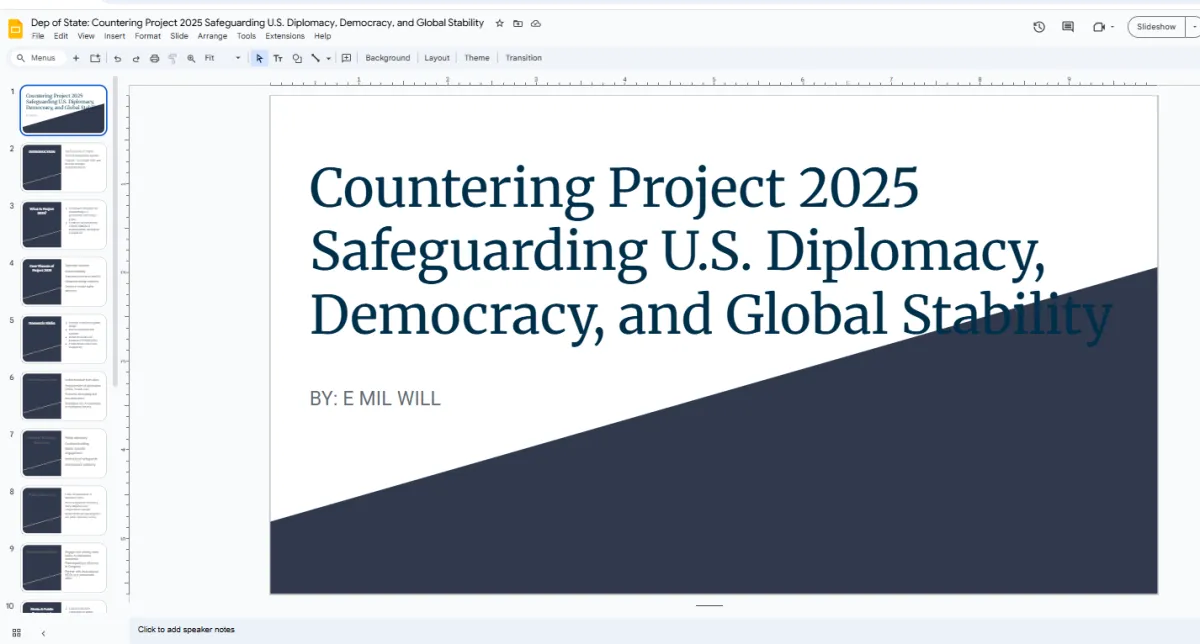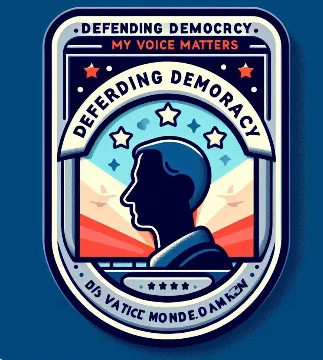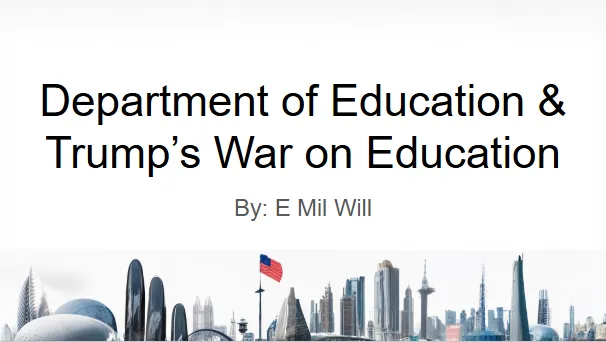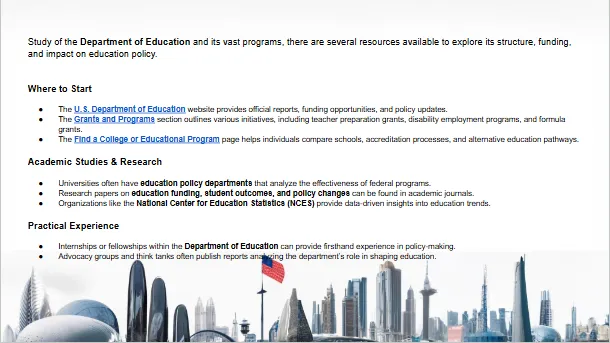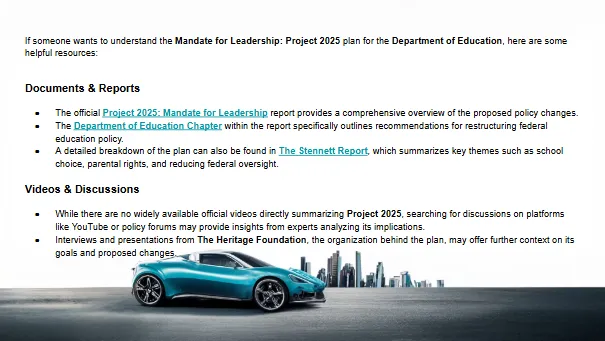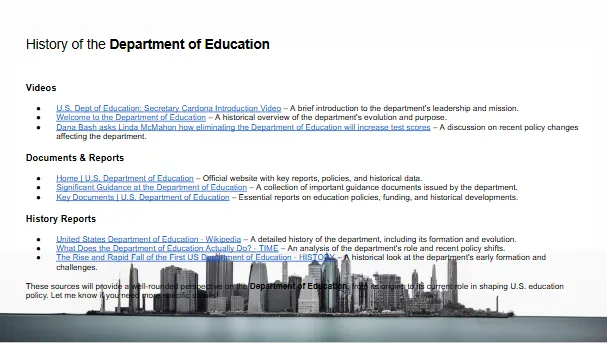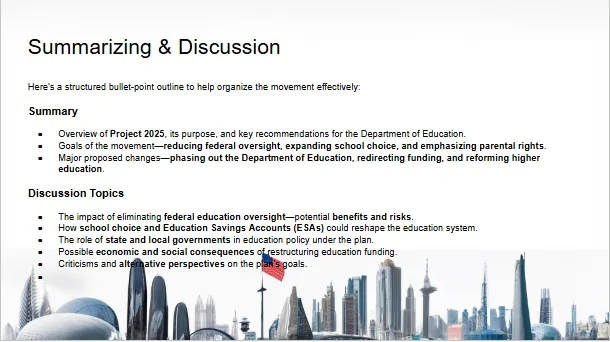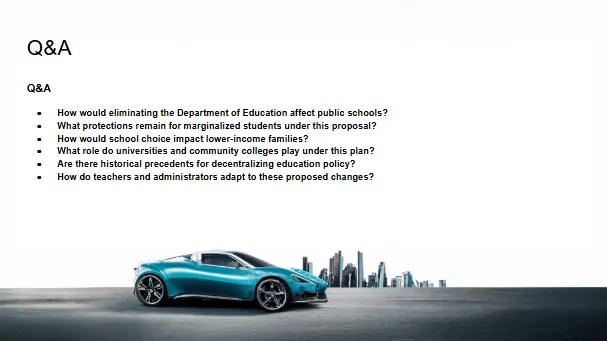UNDERSTANDING THE CONSERVATIVE PROMISE: MANDATE FOR LEADERSHIP
Project 2025 Watch
EXECUTIVE BRANCH
VS
CONSTITUTION
Chapter 6:
COMMON DEFENSE
DEPARTMENT OF STATE
Review
Reading Mandate with Summary
Summary of Project 2025's Vision for the Department of State:
Project 2025 criticizes the U.S. Department of State as an institution that has drifted from its core mission of executing the President’s foreign policy. It argues that the department is dominated by left-leaning career officials who resist conservative agendas, resulting in a lack of alignment with elected leadership.
Key Issues Identified:
The State Department is described as a "crippled institution" with poor management, disjointed policies, and a culture of bureaucratic resistance to conservative Presidents.
It is seen as ineffective not due to lack of resources, but due to a self-perception as an independent policy-making body rather than an executor of presidential vision.
Ambassadors and officials often continue implementing prior administration agendas, even after a new President is elected.
Proposed Reforms:
Leadership Overhaul: Replace or reassess all political and career ambassadors, and appoint loyal political leaders to both confirmed and non-confirmed positions immediately upon inauguration.
Bureaucratic Reorientation: Train and mentor political appointees; integrate career staff into the President’s vision without exclusion but with firm alignment.
Review and Freeze: Initiate a full review of all ongoing negotiations, funding commitments, and agreements before inauguration, with a post-inauguration freeze until alignment with the new administration is ensured.
Accountability and Oversight: Restructure how the State Department handles treaties and international commitments to reflect constitutional processes and prioritize the interests of American citizens.
Core Theme:
The Department must be “reforged” into a lean, loyal, and mission-focused agency that serves the President’s foreign policy agenda above all else.
Chapter 6: COMMON DEFENSE
DEPARTMENT OF STATE
Review
PAGE 171-200
AUTHOR: Kiron Skinner
AUTHOR BACKGROUND CHECK:
Kiron K. Skinner is a distinguished political scientist and foreign policy expert with a notable career in both academia and government service. She served as Director of Policy Planning at the U.S. Department of State from September 2018 to August 2019 under Secretary Mike Pompeo, where she provided strategic guidance on international affairs and national security citeturn0search6. In 2023, Skinner contributed to Project 2025 by authoring the chapter on the Department of State in the Heritage Foundation's Mandate for Leadership," advocating for significant restructuring to align the department more closely with presidential directives citeturn0search8. Currently, she holds the Taube Family Chair of International Relations and Politics at Pepperdine University's School of Public Policy and is a W. Glenn Campbell Research Fellow at Stanford University's Hoover Institution citeturn0search1. Skinner's work continues to influence conservative policy discussions, particularly in the realms of foreign policy and national security.
Key Issues with the State Department (under the Biden Administration):
Treaty & Agreement Process Critique:
Biden's State Department is viewed as unreliable and has delegated diplomatic authority to other agencies like DHS via C-175 authority.
Accusations that the administration is bypassing the Senate by labeling treaties as “agreements” and enforcing unratified treaties.
Calls for halting ongoing negotiations, suspending enforcement of unratified treaties, and reviewing them for constitutional compliance.
Suggests withdrawing from long-stalled treaties in the Senate (20+ years) unless they serve a critical national interest.
Recommended Reforms:
Restore Constitutional Processes: Freeze negotiations, review current agreements, and revoke improperly delegated authorities.
Reassert Senate’s treaty ratification role and increase presidential control over diplomacy.
Interagency Coordination: improve collaboration with agencies like DoD and National Security Council, ensuring alignment with presidential direction.
Dismantle bureaucratic “stovepipes” and prioritize mission unity.
Stronger Congressional Coordination: Tighten management of legislative affairs.
Political appointees should lead congressional interactions, particularly on sensitive issues.
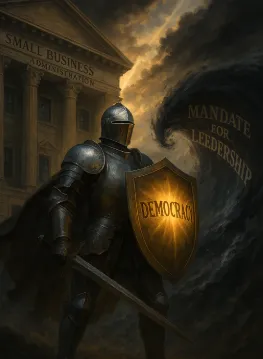
10 Ways To Protect Diplomacy DOS
1. Defend Diplomatic Independence
Preserve the professional, nonpartisan civil service: Advocate for laws and protections that prevent the mass firing or reassignment of career diplomats based on political ideology. Strengthen merit-based appointments and resist efforts to politicize ambassadorships or foreign service roles.
2. Reinforce Checks and Balances
Reassert the Senate’s constitutional role in treaty ratification and diplomatic oversight. Challenge executive overreach in court if treaty processes or international agreements are bypassed or unilaterally canceled.
3. Protect Multilateralism
Publicly support institutions like the UN, NATO, WHO, and the WTO. Expose the strategic harm of withdrawing from international coalitions, including potential retaliation or isolation.
4. Support Human Rights and Democracy Programs
Push back against efforts to dismantle or defund programs that promote women’s rights, LGBTQ+ protections, and refugee resettlement. Work with global human rights organizations to spotlight abuses and coordinate responses.
5. Promote Accurate Public Diplomacy
Modernize Voice of America and similar platforms with integrity, not propaganda. Build transparency around international broadcasting so it remains credible globally.
6. Guard Against Ideological Realignment of Foreign Policy
Monitor and call out efforts to redefine allies/adversaries based on political alignment instead of national interest and international law. Advocate for foreign policy grounded in facts, diplomacy, and long-term strategy—not culture wars or partisan agendas.
7. Build Resilient Alliances
Strengthen civil society connections with foreign counterparts—think tank-to-think tank, university-to-university, etc. Encourage Track II diplomacy (informal dialogue) during government hostility.
8. Educate & Mobilize the Public
Launch a public awareness initiative that explains what diplomacy is, why it matters, and what’s at stake under Project 2025. Encourage civic literacy about foreign policy—especially the impact on everyday Americans (jobs, security, global image).
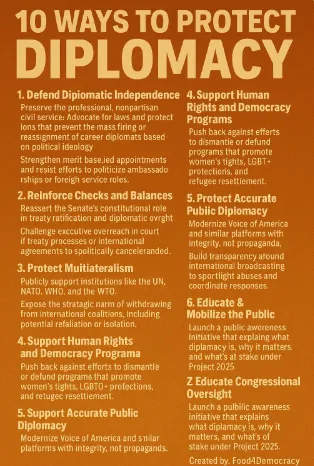
9. Support Congressional Oversight
Push Congress to require full transparency of executive foreign actions—including public hearings, reports, and regular testimony from State
officials.Support
bills that tie foreign policy actions to accountability metrics, especially on human rights and democratic values.
10. Prevent Institutional Capture
Create bipartisan commissions to monitor executive branch politicization. Encourage inspector general independence and early warnings on structural degradation or misuse of diplomatic powers.
Created by: Food4Democracy
Understanding What this Part of the Mandate Means to the World?
China Policy Focus:
Support for “China House” Concept: Streamlined coordination with a centralized office to address the China threat.
GOP administration encouraged to embrace and adapt this idea.
Calls for a Cold War-style response (an “Article X” for China) to confront China’s global ambitions.
Immigration & Domestic Security Overhaul:
Visa Reciprocity: Enforce stricter reciprocal visa access policies with other countries.
Section 243(d) Visa Sanctions:
Enforce sanctions on nations refusing to accept deported citizens.
Curtail Refugee Admissions: Shift resources from refugee programs to border enforcement in response to current immigration crisis.
Bilateral/Multilateral Agreements: Reinstate Trump-era agreements like "Remain in Mexico" and safe third-country pacts.
Limit other agencies' treaty powers except for DHS in immigration/security.
Evaluate High-Risk Visa Programs:
Review F (student), J (exchange), and Diversity Visa programs for national security risks and alignment with presidential policy.
Global Posture Reorientation:
Refocus on Strategic Threats: Prioritize U.S. posture toward China, Iran, Venezuela, Russia, and North Korea.
Promote clear definitions of allies vs. adversaries, with an assertive and cost-imposing strategy toward China.
Emphasize growth, energy independence, and unified economic-security strategies.
People’s Republic of China (PRC):
Accusations of Conspiratorial Behavior:
The PRC’s actions are described as conspiratorial, including the alleged lab-origin of COVID-19.
Critics of China are often dismissed, but the document asserts the danger is real.
Criticism of U.S. Leadership: Leaders like President Biden and corporations (e.g., BlackRock, Disney) are accused of normalizing or benefiting from the PRC’s authoritarianism.
Condemns Cooperative Strategy:
The “compete and cooperate” policy is deemed a failure.
Focus on External Pressure:
The PRC’s threat stems from historical and ideological roots; internal reform is unlikely.
Only external pressure can curb its behavior.
Islamic Republic of Iran:
Regime at Its Weakest:
Ongoing protests show Iran’s theocratic regime is faltering and disconnected from its people.
Critique of Past U.S. Policy: The Obama and Biden administrations are criticized for supporting the regime through the 2015 Iran nuclear deal, which allegedly strengthened it.
Call for Change: Advocates supporting Iranian democracy using U.S. diplomatic and economic tools without repeating prior engagement strategies.
Venezuela:
Collapse Under Communism: Venezuela has deteriorated under Chavez and Maduro, shifting from prosperity to extreme poverty, corruption, and criminal control.
Alignment with U.S. Enemies: The regime's alignment with the PRC and Iran is highlighted.
Call to Action: Urges a united Western Hemisphere front to combat Venezuela’s Communist regime and support the Venezuelan people.
Russia and Ukraine:
Divergent Conservative Views:
Pro-aid faction: Sees Russia’s war as a threat to U.S. and European stability, advocates military/economic aid.
Non-interventionist faction: Opposes U.S. involvement, argues Ukraine isn't vital to national interests.
Pragmatic faction:
Balances national interest with fiscal responsibility, favors limited, strategic involvement.
Common Ground: All agree Russia’s invasion is unjust, and China is the bigger threat.
North Korea (DPRK):
Security Threat: The U.S. must not allow North Korea to become a normalized nuclear power
.Regional Stability: Protecting allies (South Korea, Japan) and upholding nonproliferation is crucial.
Western Hemisphere:
Shift Toward Socialism:
The rise of progressive/socialist regimes is viewed as a regional threat.
Policy Proposals:
Sovereign Mexico: Describes Mexico as overrun by cartels, no longer fully sovereign. Urges U.S. action to restore order.
Combat Fentanyl Crisis:
Highlights Chinese–Mexican cartel collaboration in fentanyl production and its devastating effect in the U.S. Calls for international cooperation to stop it.
🌎 Western Hemisphere: Industry, Energy & Security
Economic Strategy:
Proposes “re-hemisphering”—shifting manufacturing from China to Central/South America.
Aims to strengthen economic ties, solve supply chain issues, and boost regional stability.
Suggests a hemispheric energy alliance with Mexico, Canada, and others to reduce reliance on global fuel markets.
Security Approach:
Warns that Latin America is being influenced by adversaries like China, Iran, and Russia.
Identifies countries like Venezuela, Colombia, Guyana, and Ecuador as security concerns.
Advocates U.S. leadership to counter external threats and stabilize the region through defense cooperation.
🌍 Middle East & North Africa
Iran:
Strong opposition to Iranian nuclear ambitions.
Endorses Trump-era sanctions and supports military/diplomatic tools to contain Iran.
Backs Israel’s right to act against Iran and its proxies (Hamas, Hezbollah, etc.).
Arab-Israeli Relations:
Promote expansion of Abraham Accords, especially with Saudi Arabia.
Suggests defunding the Palestinian Authority.
Recommends rethinking U.S. support for Kurdish groups to maintain ties with Türkiye.
Security Alliances:
Advocates building a Middle East Security Pact with Israel, Egypt, Gulf States, and possibly India.
Focus on protecting trade routes (Gulf, Suez Canal).Work with Europe (esp. France) to combat Islamist threats in North Africa.
Human Rights:
Balances strategic interests with attention to religious freedom, minority rights, and human trafficking.
🌍 Sub-Saharan Africa
Strategic Shift:
Recommends shifting from aid to private sector growth to counter Chinese influence.
Encourages American business investment and protection of critical mineral supply chains.
China & Digital Sovereignty:
Calls for strong public diplomacy and "digital hygiene" programs to protect African networks from PRC espionage.
Proposes recognizing Somaliland as leverage against China’s grip on Djibouti.
Terrorism:
Supports building African-led military capacity to counter threats like Boko Haram.
Smart Diplomacy:
Focus efforts on cooperative nations rather than spreading resources thinly.
Opposes pushing U.S. domestic culture war issues (e.g., abortion, LGBTQ policies) in Africa.
🌍 Europe
Security Burden-Sharing:
Pushes for NATO countries to meet and exceed the 2% GDP defense spending target.
Emphasizes that wealthy European nations must contribute more to their own defense.
Trade:
Views transatlantic trade as vital and recommends expanding economic ties to lessen reliance on adversarial states like China.
U.S.–EU & U.K. Relations
Trade tensions with the EU need review to ensure fairness and reciprocity.
Post-Brexit U.K. trade relations must be urgently strengthened to prevent realignment with the EU.
The U.S. should pay closer attention to internal EU dynamics, cultivating new alliances with Central European nations vulnerable to Russian aggression.
South & Central Asia
Strengthen ties with India as a strategic counterweight to China and a security partner in the Indo-Pacific.
India–Pakistan tensions, particularly over Kashmir, remain a nuclear risk.
The Taliban in Afghanistan and Pakistan's military rule are considered unreliable for normal relations.
The State Department must play a central role in a revamped South Asia strategy, especially through its involvement in the Quad (U.S., India, Japan, Australia) and possible Quad-Plus partnerships.
The Arctic
Emphasize U.S. sovereignty and economic freedom in the Arctic amid growing Russian and Chinese interests.
Promote open shipping lanes, resist monopolization, and invest in the Navy and Coast Guard, including icebreakers and unmanned systems.
Strengthen U.S. presence in Greenland, and pressure NATO to treat the Arctic as a strategic defense region, particularly with Finland and Sweden joining.
International Organizations
U.S. involvement in international bodies like the U.N. should be conditional: support only if they serve American interests.
Recommend defunding or withdrawing from ineffective or hostile organizations, citing past actions like exiting WHO and UNESCO under Trump.
Promote authentic human rights (life, family, sovereignty), opposing “radical social policies” or treating human rights treaties as “living documents.”
End U.S. funding for abortion-promoting international programs; promote the Geneva Consensus Declaration.
Be vocal against rights abuses justified under public health (e.g., WHO’s role during COVID-19).
Structural Reform of the State Department
The State Department is seen as bloated and inefficient.
Calls for a major reorganization:
Reduce overhead and redundancy.Streamline operations.
Align more closely with political leadership.
Reevaluate and possibly eliminate or restructure foreign assistance programs.
Conduct a cost-benefit analysis of participation in all international organizations.
Summary: Project 2025 - State Department Chapter
The chapter outlines a conservative restructuring of U.S. foreign policy, emphasizing alignment with the President’s agenda and prioritizing national interests over globalist or ideological efforts.
Key Recommendations:
Centralize Foreign Assistance Consolidate foreign aid authority across the federal government under a single director (ideally the USAID Administrator acting as Director of Foreign Assistance with Deputy Secretary rank) to ensure aid supports the President’s foreign policy goals.
Refocus Public Diplomacy and International Broadcasting Revive and strengthen U.S. international broadcasting (e.g., Voice of America) to promote American ideals and counter global misinformation.
Recommit to pro-freedom messaging, particularly as public diplomacy has weakened since the Cold War.
Expand Cyber Diplomacy Elevate cyberspace issues in diplomacy. Shift from informal, non-binding standards to enforceable international norms. Collaborate with allies to push back against authoritarian cyber tactics from China and Russia, and support a more offensive cyber posture alongside the Department of Defense.
Conclusion:
The next conservative administration should reshape foreign policy to reflect the President’s direct vision, discard progressive or special interest-driven initiatives, and root U.S. strategy in a firm commitment to national interest.

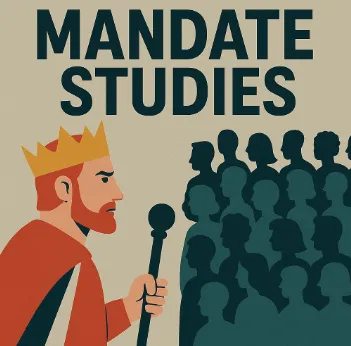
Understanding How the Mandate Effects Our Government by Sections of the Mandate
The following is a breakdown of the 900+ pages in a deeper breakdown of the authors, the standards, diagnosing the reforms, deep understanding of what our tax payer dollars provide and a deeper understanding of the deep Right. We do not have a deep Left issue, we have a issue with those who are lacking credibility with plans that are outlined in black and white. Instead of just living through the next 4 years, learn from America's Mistake for allowing nepotism to override political career morally sound individuals to decide people's fate versus those who are born of privilege. In these library of collective thoughts please feel free to join the movement...
Monitoring the Mandate by diving into the authors, contributors and current implementation of the project 2025 mandate created in 1978 first ran by Ronald Raegan with the Heritage Foundation.
Understanding the fundamentals of the Mandate by diving into the theories, philosophies and breakdowns from the section "Taking the Reins of Government" with break downs from
Understanding the fundamentals of the Mandate by diving into the theories, philosophies and breakdowns from the section "The Common Defense" with break downs from:
Understanding the fundamentals of the Mandate by diving into the theories, philosophies and breakdowns from the section "The General Welfare" with break downs from:
Understanding the fundamentals of the Mandate by diving into the theories, philosophies and breakdowns from the section "The Economy" with break downs from:
Understanding the fundamentals of the Mandate by diving into the theories, philosophies and breakdowns from the section "Independent Regulatory Agencies" with break downs from:
Understanding the fundamentals of the Mandate by diving into the theories, philosophies and breakdowns from the section "Onward" with break down and final thoughts on project 2025:
Understanding the Mandate , What it means to you and how can we grow from learning it.

Stand up for US Department of Education Against Project 2025 Mandates
The future of education is at a crossroads, and the Department of Education plays a vital role in ensuring access to quality learning opportunities for all. However, proposed policies threaten to dismantle essential programs, impacting students, teachers, and communities nationwide. By joining together, we can advocate for a strong, well-supported education system that prioritizes inclusivity, innovation, and success. Whether through raising awareness, participating in discussions, or pushing for informed policies, every effort counts in safeguarding the integrity of public education.
This is a call to action for educators, advocates, and concerned citizens to come together and make a difference. Through collective knowledge and active engagement, we can challenge harmful reforms and champion initiatives that strengthen the Department of Education. The upcoming virtual workshop on April 21-23 will provide key insights into these urgent matters, equipping participants with the tools to take action. Let’s stand for the future of education—because protecting learning today ensures a brighter tomorrow for all. Join us in this mission and help drive meaningful change!
Power Point For 3 Day Workshop 6pm-8pm April 21-23, 2025
Understanding the Mandate Which Touches the Following
The following is a breakdown of the 900+ pages in a deeper breakdown of the authors, the standards, diagnosing the reforms, deep understanding of what our tax payer dollars provide and a deeper understanding of the deep Right. We do not have a deep Left issue, we have a issue with those who are lacking credibility with plans that are outlined in black and white. Instead of just living through the next 4 years, learn from America's Mistake for allowing nepotism to override political career morally sound individuals to decide people's fate versus those who are born of privilege. In these library of collective thoughts please feel free to join the movement...
Executive overreach redefining the Constitution and it's relationship with the other branches
The Common Defense Outlining the Agency Roles
US Press
International Press
The Economy Outlines the Roles
Case for Fair Trade
Case For Free Trade
The Independent Regulatory Agencies Outlines the Roles For Agencies
The propose for this Summary is in an attempt to allow others to understand that this mission statement known as the Mandate is different than just a political movement. This movement purpose is not meant to help those who it claims to and we would argue that their Mandate has and will do damage to our world. This has been a journey of exploration, interesting, hypocritical, short sighted and often times cruel in nature.
Small Call to Action Headline
Small Call to Action Headline

Website Development
Custom Website DesignResponsive Web DevelopmentUser Experience (UX) DesignE-commerce Website DevelopmentContent Management System (CMS) Integration

Dev Development
Full-Stack DevelopmentFrontend DevelopmentBackend DevelopmentAPI Development and IntegrationDatabase Design and Management

Scrum Master Services
Agile Project ManagementScrum Master ConsultationSprint Planning and ExecutionTeam Collaboration and CoordinationContinuous Improvement Strategies
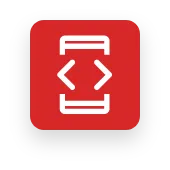
Mobile App Design
iOS App Development
Android App Development
Cross-Platform App Development
Mobile App UI/UX Design
App Maintenance and Support

Online Marketing
Search Engine Optimization (SEO)Social Media MarketingContent MarketingEmail MarketingPay-Per-Click (PPC) Advertising

Drone Services
Aerial Photography and VideographyDrone Mapping and SurveyingInspection and Monitoring ServicesGIS (Geographic Information System) IntegrationCustom Drone Software Development
“ eMillion Concepts. eMillion People. eMillion Solutions.”
© 2024 E-Millions Consulting Services - All Rights Reserved,
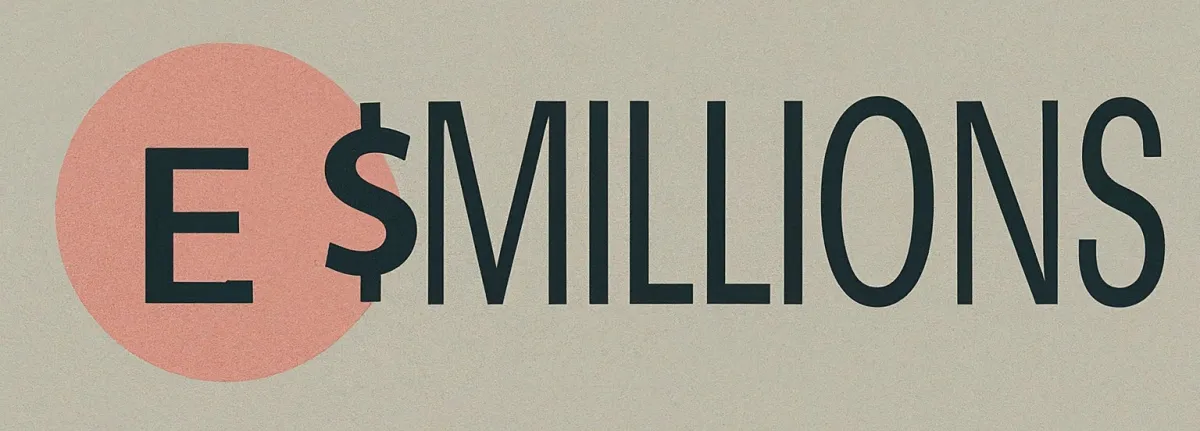
etechmilli@gmail.com
(404) 723-3940
© 2026 Company Name - All Rights Reserved, consectetur adipiscing elit. Maecenas commodo suscipit tortor, vel tristique sapien
